FIRED & FABULOUS
A quest for bread making’s Holy Grail
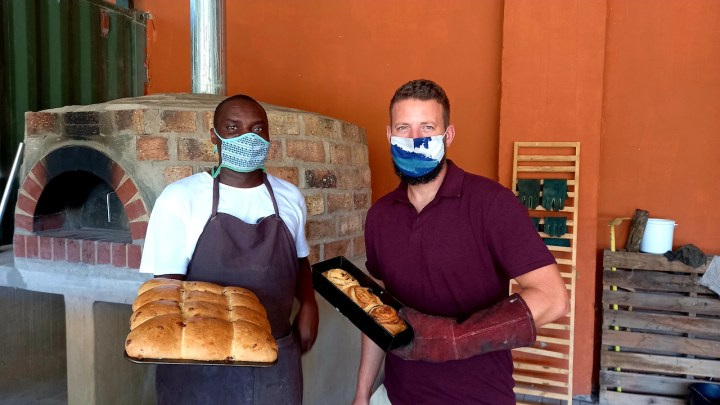
Baking bread in a wood-fired oven is considered the holy grail. It wasn’t exactly what David Henry had in mind. But now every bake is a learning curve. And his sourdough chocolate croissants are an unforgettable experience.
Oh ye of little faith, the “ye” being me. Thing is, so often croissants disappoint. But probably because the rare good one is such… pleasure, this little optimistic voice – the power of intermittent reinforcement, I suspect – whispers: “Go on, try!”
So, “and a chocolate croissant”, I say, when buying my loaf of sourdough rye and my half-dozen sourdough Portuguese rolls. And yes, this is a sourdough croissant. And they’ve all just come out of the wood-fired oven, where earlier, when invited to peek inside, I saw the little wood pile, over at the side, smouldering fiery red-hot.
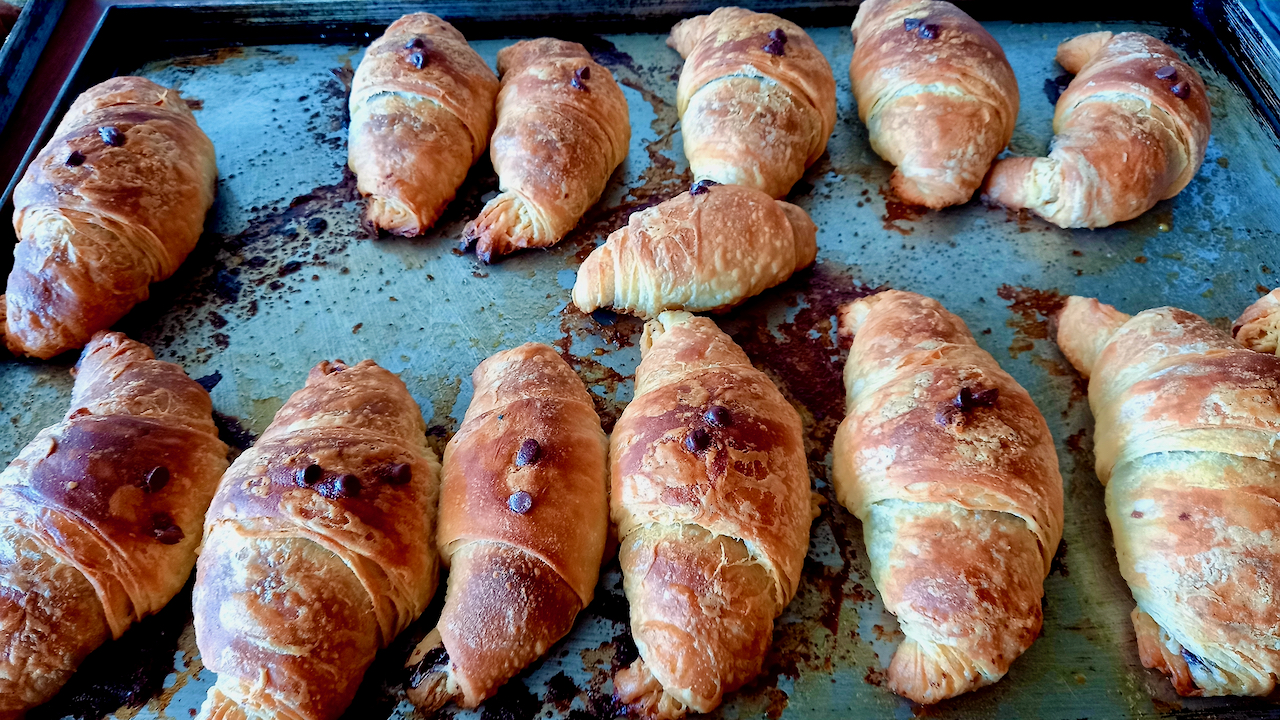
Bliss on a tray aka chocolate croissants. (Photo: Wanda Hennig)
It is in part because the loaves are so “rustic”, to quote David Henry, Breadologie Wood-Fired Bakery’s owner-baker, that I don’t expect to bite into this croissant, through an exquisitely crunchy crunch, and find dreamy blissful buttery lightness and oozing melty sublime chocolate, to relate my direct experience, and conclude I have just encountered a chocolate croissant to top all others to date.
Breadologie’s home is a creative, artistic, inviting, functional arrangement of containers set in a large garden with lawn, fire-pit and in-progress pétanque terrains (courts) located on a farm with an indigenous nursery near Sheffield Beach north of Durban.
It was previously, before Henry took a three-year lease (renewable), an artist’s gallery and work studios.
He has added a kind of welcoming home-baked charm with windows purchased from Atomic Demolishers (which, going back years, has been a repository of treasures, if one is prepared to go dig around for them). And he has added table-benches to create a café area for coffee and light (bread-based) meals.
He is going to be selling local produce, preserves and veggies. Cheeses and garlic from the Midlands. Someone who makes organic body products is moving into a room at the side. Someone else will settle into an adjoining space to sell indoor nursery plants.
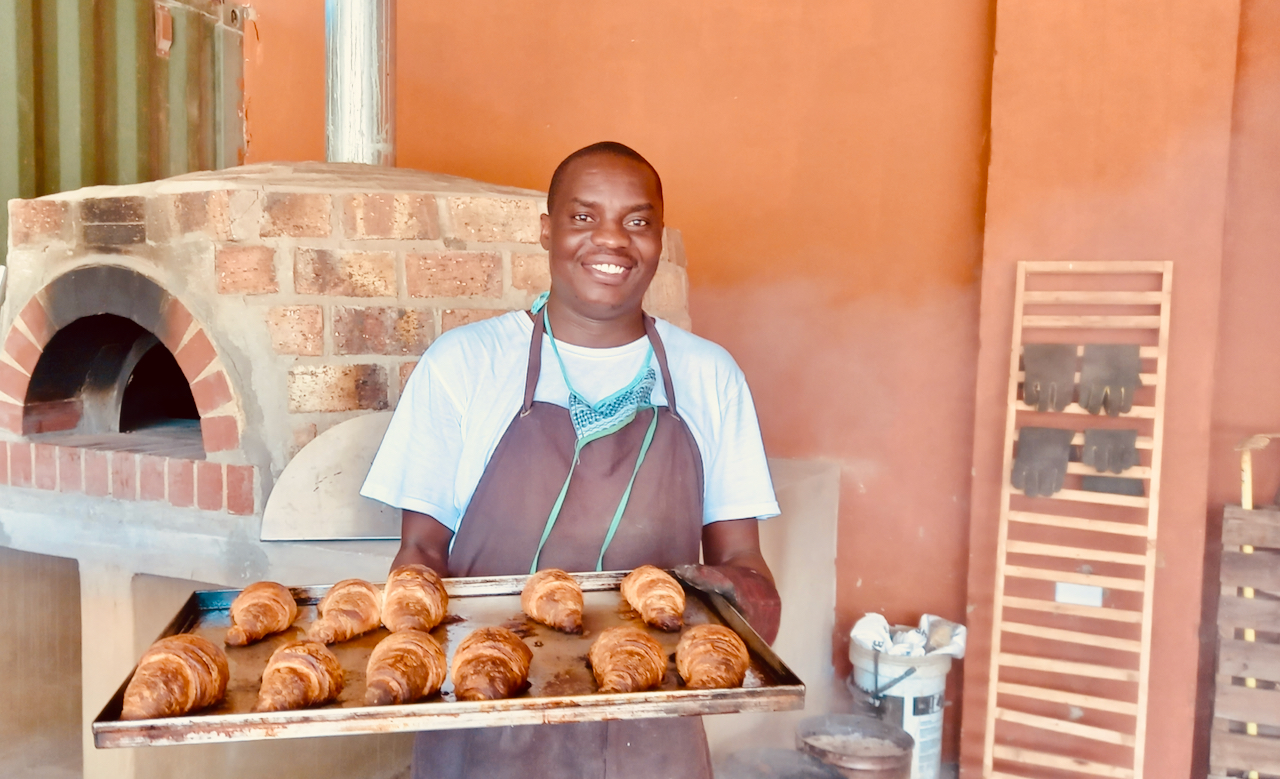
Baker Stanley Chibatwa with a tray just-baked croissants. (Photo: Wanda Hennig)
One of the containers out back is the kitchen for the bakery with its wood-fired oven, purchased after a lot of research from a company in Pretoria that manufactures them.
It is where Henry shares the baking with Stanley Chibatwa, whom he found by word of mouth when looking for an experienced baker to join him. As luck would have it for both of them, Chibatwa, an interesting man whose CV includes opening and running bakeries for a couple of years in Afghanistan, had recently – thanks to Covid-19 closures – lost his bakery job in Pietermaritzburg.
When alcohol restrictions are lifted, a second container out back is likely to have a sommelier and offer wine tastings and sales.
Henry also has pizza evenings planned. And out-door movies. And workshops around bread. And training.
Which was the idea behind how all this began.
Training.
His initial vision when he signed the lease involved investors and a business plan. Then Covid-19 came and in collaboration with his wife, Monica – who does, he says, Breadologie’s social media and is involved with the decor – he transformed his vision into something simpler that he could manage and fund himself.
Which takes us back to his story. Or more aptly, his back story. Worth recounting in brief. As when he shared it, I got the sense that everything in his life right now has come together, sort of like the perfect storm when this term is applied to a positive confluence of events.
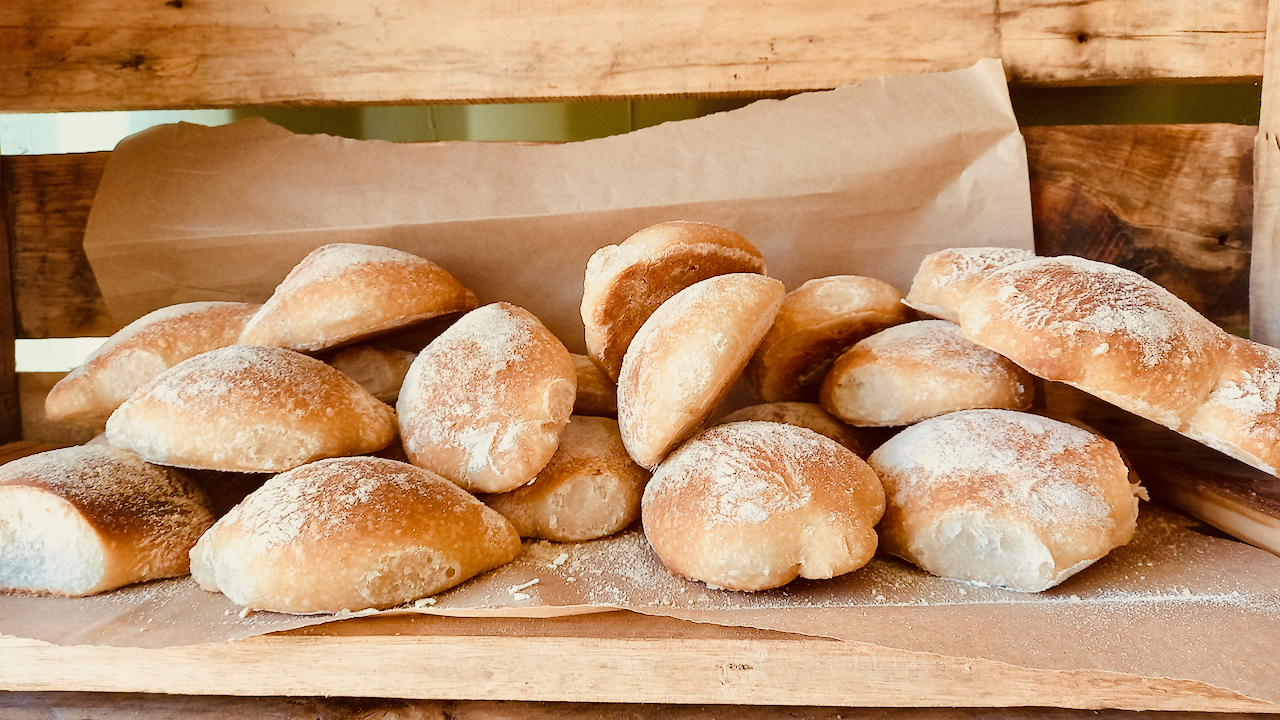
Mozambique-inspired Portuguese rolls. (Photo: Wanda Hennig)
Henry was born in Switzerland. His dad, whose expertise was water and sanitation, worked for the Swiss Development Corporation and the family lived in Niger, Mali and Togo before they settled in Mozambique, which is where Henry did his A-levels at the Maputo International School.
He then returned to Switzerland, completed his mandatory Swiss military service, then enrolled at the Swiss Hotel Management School in Leysin for a degree in hospitality and tourism.
His subsequent internship, as commis chef, was at a palace in Switzerland. “They’re Victorian buildings, now hotels but called palaces,” he explains. And for good reason. To be awed (well, I was) see this link on Switzerland castle hotels.
While management had been his focus, “… in your 20s, you’re discovering what you want to do. I had loved eating, but then I discovered baking and cooking…”
It was an organic hands-on love affair with food that would sustain.
After his internship and working in a couple more Swiss restaurant kitchens, Henry returned to Mozambique. Managed restaurants there. (He names the Maputo Waterfront when I ask for any we might be familiar with.)
Back in Maputo he also reconnected with Monica, now his wife. Born in South Africa – and initially in Mozambique, like him, with her parents – they had met and dated when at the same (international) high school. While he’d been getting qualified in Switzerland, she’d been in Australia doing a degree in social anthropology.
Reunited and committed, they both trained as dive masters and went to work at Morrungulo, a pristine resort in Inhambane province north of Maputo. Here, they connected with Aaron Rattray, from Hillcrest, who I met last week: on his first day as frontman and assistant baker at Breadologie.
After about eight months as dive masters, “Monica and I moved to northern Mozambique to be general managers at Nuarro Lodge, a community project.” The Dutch-owned resort is on the Baixo do Phinda peninsula in Nampula province.
Having grown up in a family that did developmental work, Henry was drawn by what would fill the boxes eco-friendly, sustainable and responsible. “Being a community upliftment project, the hotel positions are filled by members of the community. Staff are trained in-house. We bought fish from the fishing village. We built schools and clinics.” The guests were mainly European. The business funds the job-training. The project is ongoing. Donations come from guests who buy in.”
The couple were there for three years.
“It was our first experience with solar. The next town was four hours away along a bad road. You learned a lot. You saw what worked and what didn’t work.” They learned to be adaptable and inventive.
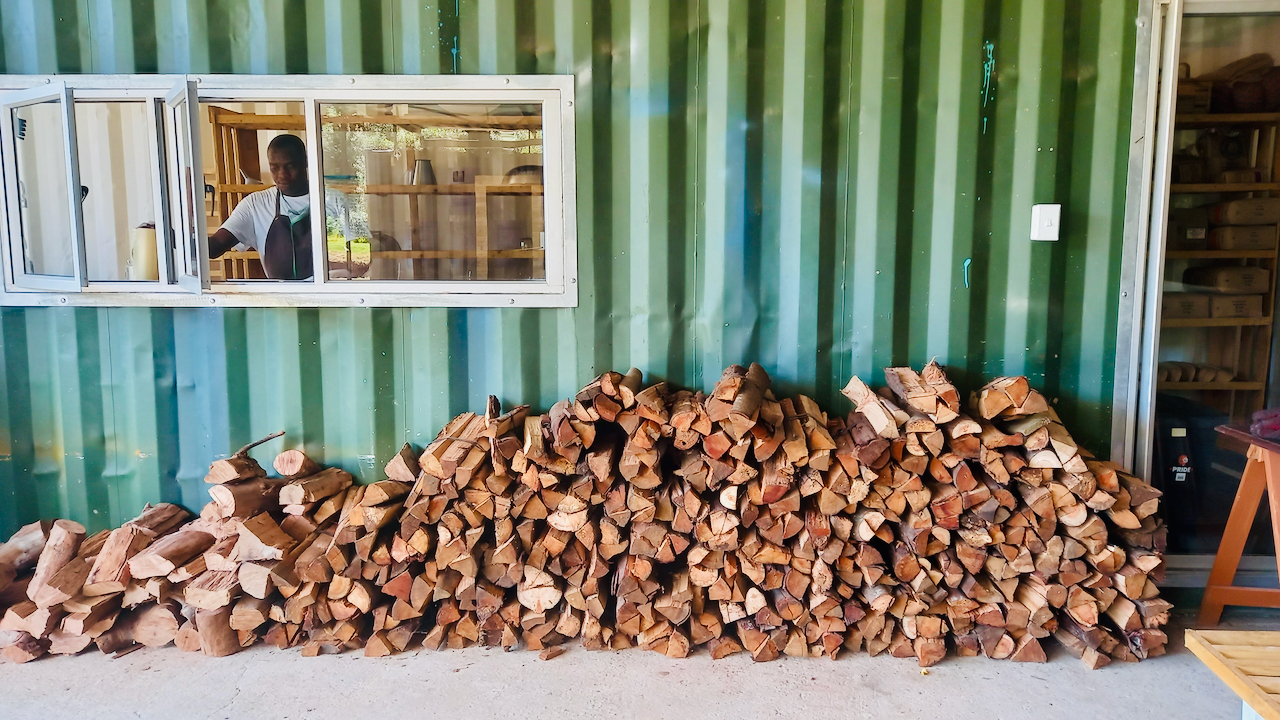
Stanley Chibatwa in the kitchen container plus wattle and casuarina chopped for the bake. (Photo: Wanda Hennig)
All of which, including the solar, has come into play at Breadologie, where there is no electricity, hence the wood-fired oven. And they’ve put in solar.
After three years at Nuarro Lodge they were ready for change. They travelled through South America. Then moved to Switzerland, where Henry got a job lecturing at the Swiss Education Group Hotel Institute Montreux management school.
He was soon a programme leader in the food and bev operations. He was there for more than three years. “But after creating and developing the content, the time came when the challenge was gone and we decided to return to Mozambique.”
His vision was to train people in hospitality; to teach people who were not in a position to pay. And to consult for restaurants that were.
Things didn’t go quite according to plan. “It is very difficult to get a permit to live in Mozambique if you’re a foreigner. Monica has family here. We’d been to this (Sheffield Beach) area often so we knew it and liked it so we decided to come here.
“Switzerland is a lovely country,” he says when I ask why not back there? “And I love the food scene. But it’s grey most of the time and I grew up in the sunshine. In Mozambique, where the people are warm and friendly and want to share. Same as people here: warm and friendly and open. I think it’s to do with the warmth of the weather.
“And there’s more scope here to do positive things. To motivate and help others.”
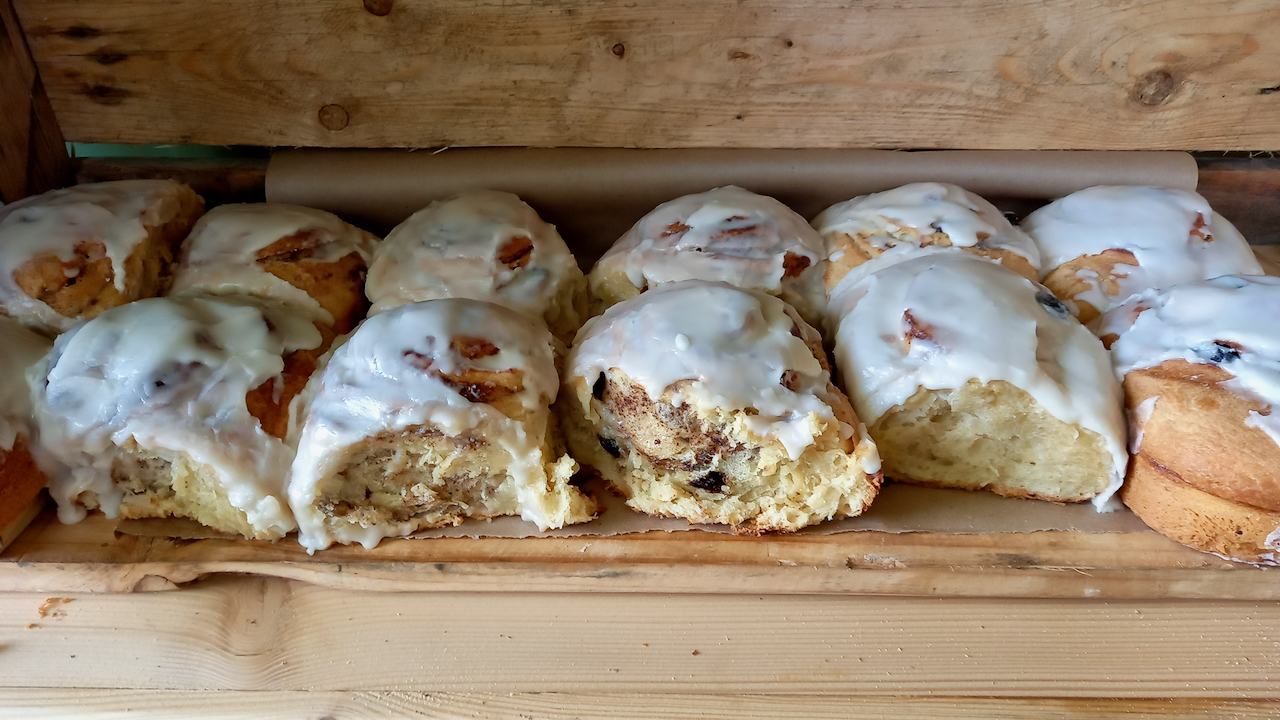
Sourdough wood-fired Chelsea buns, made on request and now a favourite. (Photo: Wanda Hennig)
If you look at the Breadologie Facebook page, you can see a web link to Swiss Inc Services (the “inc” being an abbreviation for inc-ubator). “Value each other and in each other, find value” is the message that greets you when you click through.
Henry’s brief formal resume, on the About page, gives an idea of the direction he was headed in before Breadologie was born.
“I was going to set up a small restaurant here primarily to train people who couldn’t otherwise afford training.” That’s where the business plan, and investors, would have come in.
But in the face of Covid-19, he changed gears.
Instead he’s making Chelsea buns.
While remaining committed to training. Job-training at Breadologie. Plus holding workshops for people interested in bread-making. And at some point he expects he will help people in communities build wood-fired ovens.
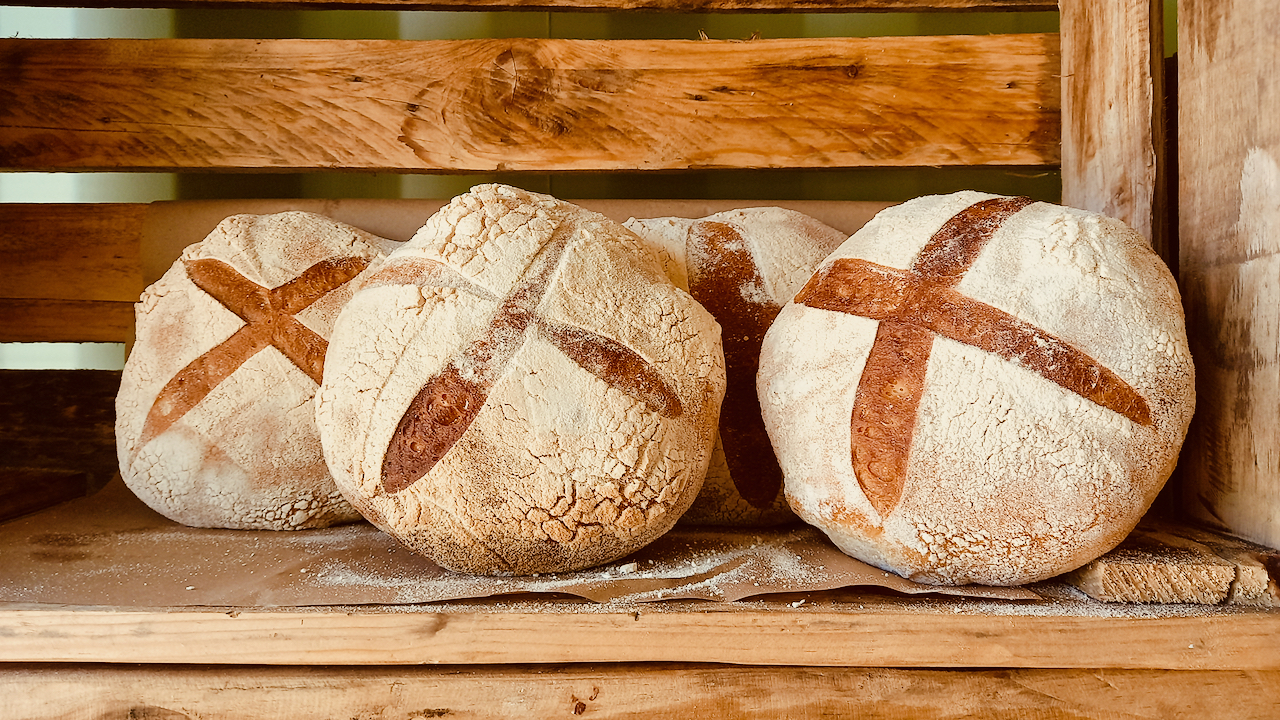
Rustic wood-fired sourdough loaves baked and ready. (Photo: Wanda Hennig)
“The owners of this property gave a grace period on the rental, which was such a help. It was like, everything started coming together.”
They only opened in November. Going on three months.
“We started with basic breads: white, wholewheat, rye.”
They continued with what people requested.
“There’s quite a sweet tooth in the area. We’re doing Chelsea buns. Chocolate brioche buns. Carrot cake. Then a lot of people asked for croissants. We tried. With sourdough.
“People wanted ciabatta, but I don’t do that. I’m not Italian and I don’t know how. There’s an art to the ciabatta. I need to go to Italy to learn.
“But I do an adaptation of Portuguese rolls and a Portuguese loaf. These have milk, so in a way are similar to ciabatta.
“And Genoese focaccia. I can do that. And pizza bases. We started making those.”
Baking bread in a wood-fired oven is considered the holy grail, taking the craft to its origins.
But there are challenges.
Weather, for one, plays a big part, baking this way.
“We want a slow process but heat impacts the bacteria, which rises quicker. Which means things have to be done quicker, earlier or later.
“We have to see and try. We’ve learned we need to knead later, so by 6pm we can put the dough in the fridge. There’s been a lot of trial and error. In a wood-fired oven, heat is not a constant. The heat shifts. So every bake is a learning curve.”
Aware of potential environmental impact, they cut and burn wattle and casuarina: “Both are invasive species.”
“Stanley and I alternate shifts,” Henry says.
“He starts at 5am one day, I do the next. It takes one-and-a-half hours to get a good fire. We bake 7am to 9am. Then we’re kneading and mixing from 10am for the next day.”
The chocolate croissants. Those go in towards the end of the bake.
What I’ll be making the drive from Durban for, any time I can. DM/TGIFood




Lovely article! Thank you.
A shame I’m a two hour flight away.